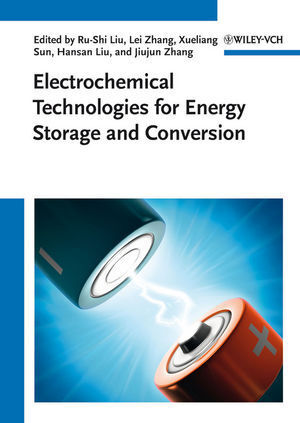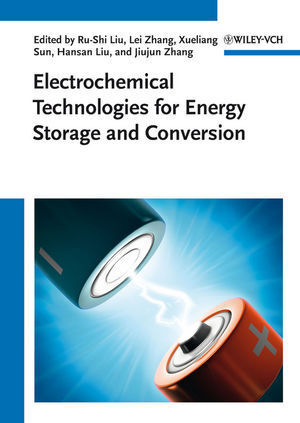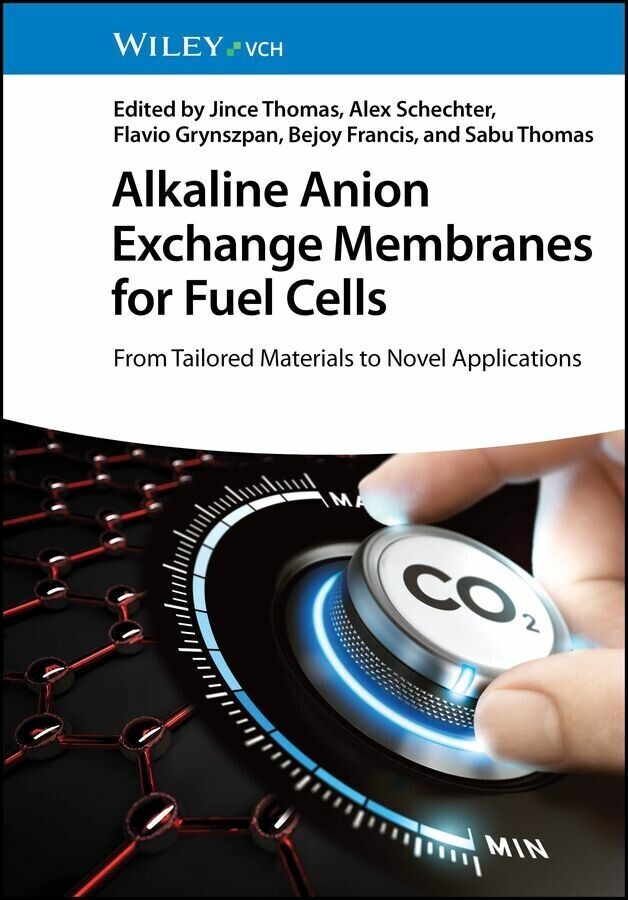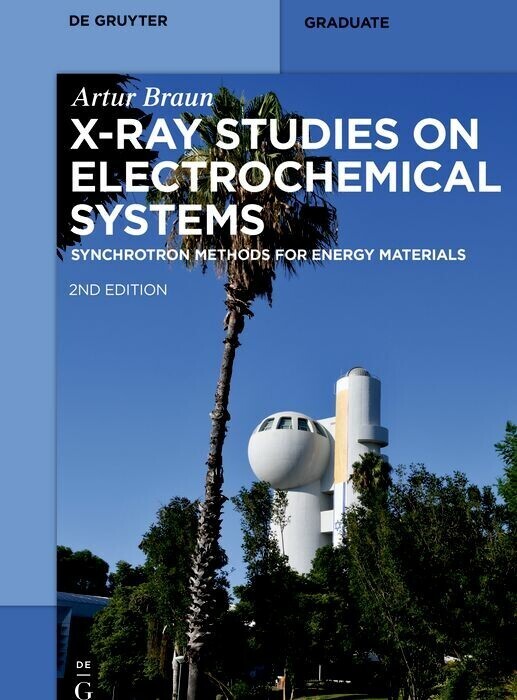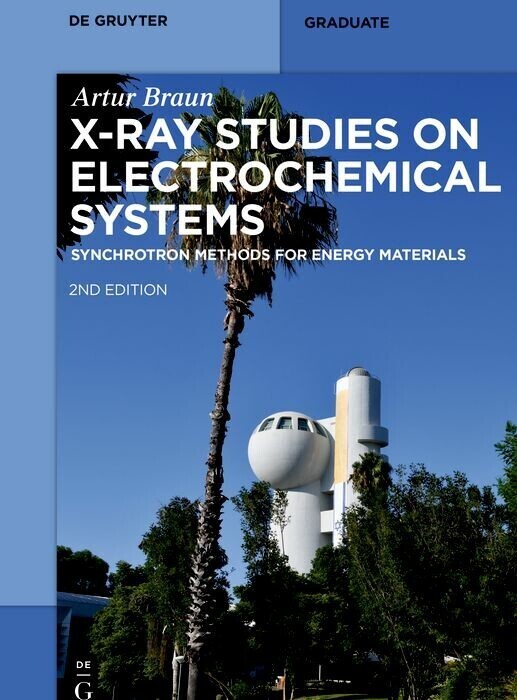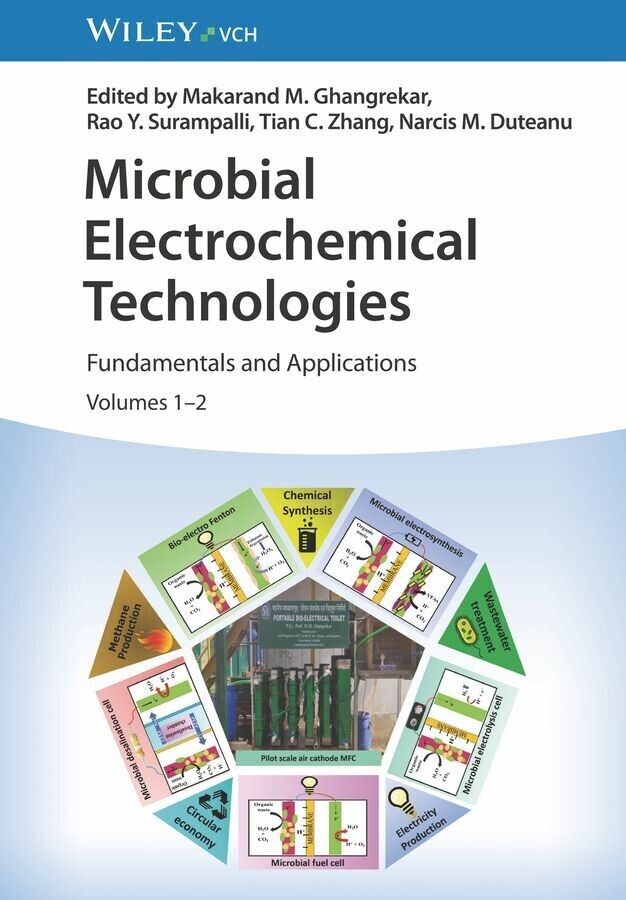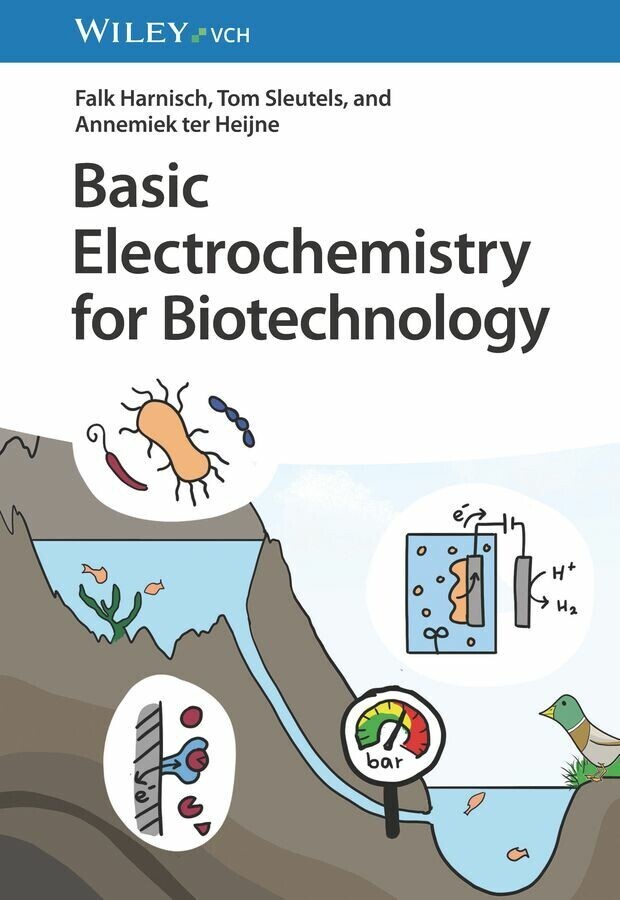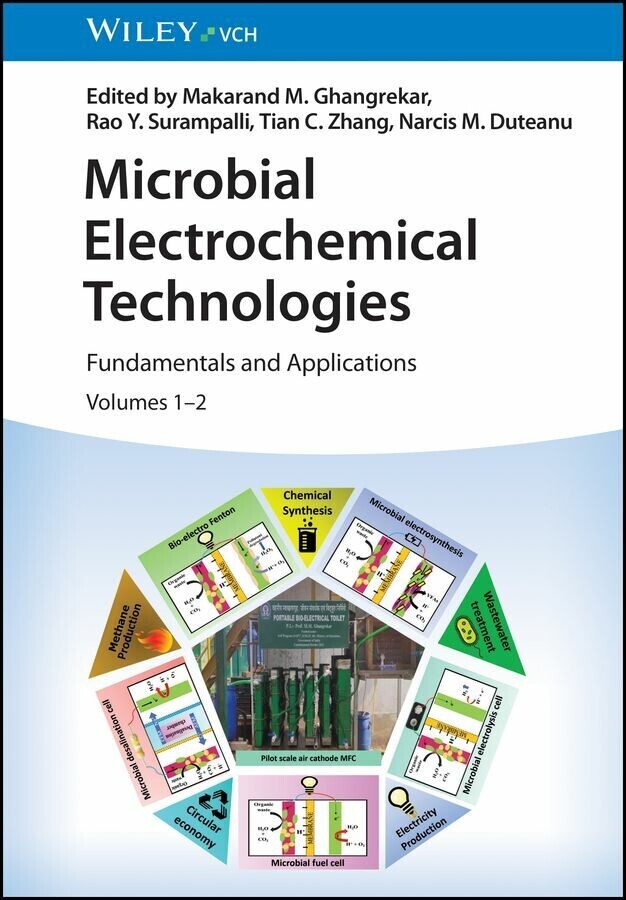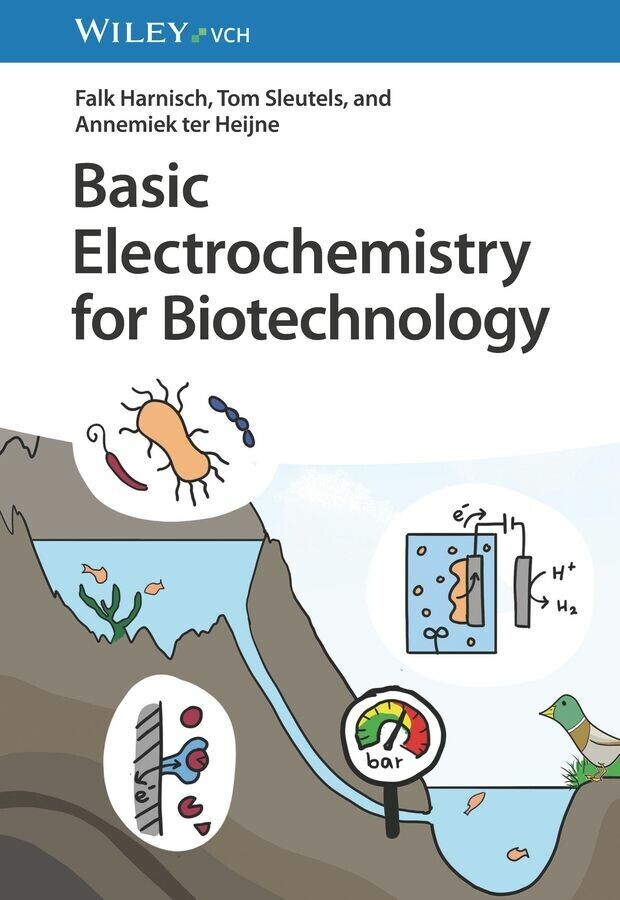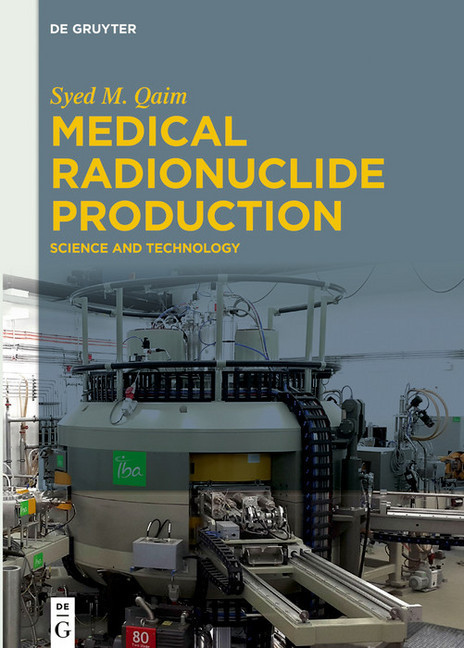Electrochemical Technologies for Energy Storage and Conversion
In this handbook and ready reference, editors and authors from academia and industry share their in-depth knowledge of known and novel materials, devices and technologies with the reader. The result is a comprehensive overview of electrochemical energy and conversion methods, including batteries, fuel cells, supercapacitors, hydrogen generation and storage as well as solar energy conversion. Each chapter addresses electrochemical processes, materials, components, degradation mechanisms, device assembly and manufacturing, while also discussing the challenges and perspectives for each energy storage device in question. In addition, two introductory chapters acquaint readers with the fundamentals of energy storage and conversion, and with the general engineering aspects of electrochemical devices.
With its uniformly structured, self-contained chapters, this is ideal reading for entrants to the field as well as experienced researchers.
Lei Zhang is a Research Council Officer at the National Research Council of Canada Institute for Fuel Cell Innovation. She received her first M.Sc. in inorganic chemistry from Wuhan University in 1993, and her second in materials chemistry from Simon Fraser University, Canada in 2000. She is an adjunct professor at the Federal University of Maranhao, Brazil and at the Zhengzhou University, China, in addition to being an international advisory member of 7th IUPAC International Conference on Novel Materials and their Synthesis and an active member of the Electrochemical Society and the International Society of Electrochemistry. Ms. Zhang has co-authored over 90 publications and holds five US patent applications. Her main research interests include PEM fuel cell electrocatalysis, catalyst layer/electrode structure, metal-air batteries/fuel cells and supercapacitors.
Ru-Shi Liu received his bachelor?s degree in chemistry from Shoochow University, Taiwan, in 1981, and his master's in nuclear science from the National Tsing Hua University, two years later. He gained one Ph.D. in chemistry from National Tsing Hua University in 1990, and one from the University of Cambridge in 1992. From 1983 to 1995 he worked as a researcher at the Industrial Technology Research Institute, before joining the Department of Chemistry at the National Taiwan University in 1995 where he became a professor in 1999. He is a recipient of the Excellent Young Person Prize, Excellent Inventor Award (Argentine Medal) and Excellent Young Chemist Award. Professor Liu has over 350 publications in scientific international journals as well as more than 80 patents to his name.
Hansan Liu is a researcher at the Oak Ridge National Laboratory, US Department of Energy. He obtained his Ph.D. in electrochemistry from Xiamen University where he studied cathode materials for lithium ion batteries. After graduation, he worked at the Hong Kong Polytechnic University and the National Research Council Canada on electrophotocatalysis and fuel cell electrocatalysis, respectively. He is currently working on next generation high-energy density batteries at ORNL. Dr. Liu has 14 years of research experience in the field of electrochemical energy storage and conversion. His research interests mainly include battery and supercapacitor materials, fuel cell electrocatalysts, and synthesis and applications of high surface area materials. He has authored and co-authored over 70 publications, including 3 books, 4 book chapters and 3 patent applications relating to batteries and fuel cells. Dr. Liu is an active member of the Electrochemical Society and the International Society of Electrochemistry.
Xueliang (Andy) Sun holds a Canada Research Chair in the development of nanomaterials for clean energy, and is Associate Professor at the University of Western Ontario, Canada. He received his Ph.D. in materials chemistry in 1999 from the University of Manchester, UK, after which he worked as a postdoctoral fellow at the University of British Columbia, and as a research associate at l'Institut national de la recherche scientifique, Canada. He is the recipient of a number of awards, including the Early Researcher award, Canada Research Chair award and University Faculty Scholar award, and has authored or co-authored over 100 papers, 3 book chapters and 8 patents. Over the past decade, Dr. Sun has established a remarkable track record in nanoscience and nanotechnology for clean energy, mainly in the synthesis and structure control of one-dimensional nanomaterials, as well as their applications for fuel cells and Li ion batteries.
Currently a Senior Research Officer and PEM Catalysis Core Competency Leader at the National Research Council of Canada Institute for Fuel Cell Innovation, Jiujun Zhang received his B.Sc. andM.Sc. in electrochemistry from Beijing University, China, in 1982 and 1985, respectively, and his Ph.D. in electrochemistry from Wuhan University in 1988. After this, he took up a position as an associate professor at the Huazhong Normal University, and in 1990 carried out three terms of postdoctoral research at the California Institute of Technology, York University, and the University of British Columbia. Dr. Zhang holds several adjunct professorships, including one at the University of Waterloo and one at the University of British Columbia, and is an active member of The Electrochemical Society, the International Society of Electrochemistry, and the American Chemical Society. He has 240 publications and around 20 patents or patent publications to his name. Dr. Zhang has over 28 years of R&D experience in theoretical and applied electrochemistry, including over 14 years of R&D in fuel cell, and three years of experience in electrochemical sensor.
With its uniformly structured, self-contained chapters, this is ideal reading for entrants to the field as well as experienced researchers.
Lei Zhang is a Research Council Officer at the National Research Council of Canada Institute for Fuel Cell Innovation. She received her first M.Sc. in inorganic chemistry from Wuhan University in 1993, and her second in materials chemistry from Simon Fraser University, Canada in 2000. She is an adjunct professor at the Federal University of Maranhao, Brazil and at the Zhengzhou University, China, in addition to being an international advisory member of 7th IUPAC International Conference on Novel Materials and their Synthesis and an active member of the Electrochemical Society and the International Society of Electrochemistry. Ms. Zhang has co-authored over 90 publications and holds five US patent applications. Her main research interests include PEM fuel cell electrocatalysis, catalyst layer/electrode structure, metal-air batteries/fuel cells and supercapacitors.
Ru-Shi Liu received his bachelor?s degree in chemistry from Shoochow University, Taiwan, in 1981, and his master's in nuclear science from the National Tsing Hua University, two years later. He gained one Ph.D. in chemistry from National Tsing Hua University in 1990, and one from the University of Cambridge in 1992. From 1983 to 1995 he worked as a researcher at the Industrial Technology Research Institute, before joining the Department of Chemistry at the National Taiwan University in 1995 where he became a professor in 1999. He is a recipient of the Excellent Young Person Prize, Excellent Inventor Award (Argentine Medal) and Excellent Young Chemist Award. Professor Liu has over 350 publications in scientific international journals as well as more than 80 patents to his name.
Hansan Liu is a researcher at the Oak Ridge National Laboratory, US Department of Energy. He obtained his Ph.D. in electrochemistry from Xiamen University where he studied cathode materials for lithium ion batteries. After graduation, he worked at the Hong Kong Polytechnic University and the National Research Council Canada on electrophotocatalysis and fuel cell electrocatalysis, respectively. He is currently working on next generation high-energy density batteries at ORNL. Dr. Liu has 14 years of research experience in the field of electrochemical energy storage and conversion. His research interests mainly include battery and supercapacitor materials, fuel cell electrocatalysts, and synthesis and applications of high surface area materials. He has authored and co-authored over 70 publications, including 3 books, 4 book chapters and 3 patent applications relating to batteries and fuel cells. Dr. Liu is an active member of the Electrochemical Society and the International Society of Electrochemistry.
Xueliang (Andy) Sun holds a Canada Research Chair in the development of nanomaterials for clean energy, and is Associate Professor at the University of Western Ontario, Canada. He received his Ph.D. in materials chemistry in 1999 from the University of Manchester, UK, after which he worked as a postdoctoral fellow at the University of British Columbia, and as a research associate at l'Institut national de la recherche scientifique, Canada. He is the recipient of a number of awards, including the Early Researcher award, Canada Research Chair award and University Faculty Scholar award, and has authored or co-authored over 100 papers, 3 book chapters and 8 patents. Over the past decade, Dr. Sun has established a remarkable track record in nanoscience and nanotechnology for clean energy, mainly in the synthesis and structure control of one-dimensional nanomaterials, as well as their applications for fuel cells and Li ion batteries.
Currently a Senior Research Officer and PEM Catalysis Core Competency Leader at the National Research Council of Canada Institute for Fuel Cell Innovation, Jiujun Zhang received his B.Sc. andM.Sc. in electrochemistry from Beijing University, China, in 1982 and 1985, respectively, and his Ph.D. in electrochemistry from Wuhan University in 1988. After this, he took up a position as an associate professor at the Huazhong Normal University, and in 1990 carried out three terms of postdoctoral research at the California Institute of Technology, York University, and the University of British Columbia. Dr. Zhang holds several adjunct professorships, including one at the University of Waterloo and one at the University of British Columbia, and is an active member of The Electrochemical Society, the International Society of Electrochemistry, and the American Chemical Society. He has 240 publications and around 20 patents or patent publications to his name. Dr. Zhang has over 28 years of R&D experience in theoretical and applied electrochemistry, including over 14 years of R&D in fuel cell, and three years of experience in electrochemical sensor.
Zhang, Jiujun
Zhang, Lei
Liu, Hansan
Sun, Andy
Liu, Ru-Shi
| ISBN | 9783527640072 |
|---|---|
| Artikelnummer | 9783527640072 |
| Medientyp | E-Book - ePUB |
| Copyrightjahr | 2012 |
| Verlag | Wiley-VCH |
| Umfang | 838 Seiten |
| Sprache | Englisch |
| Kopierschutz | Adobe DRM |

